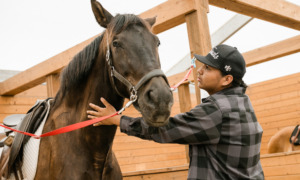UCLA School of Public Health
This cross-section survey was drawn from interviews with 749 white, Latino and black Los Angeles County youth (average age: 15) to identify trends associated with having role models. Results indicate that while having a role model is significantly associated with income level, ethnicity and gender are also major factors.
Among the 56 percent of youth who identified a role model, the report says 86 percent chose a role model of the same gender (males did so 91 percent of the time), while 71 percent chose a role model of the same race. Almost all (96 percent) of the black youth chose along ethnic lines, while Latino youth only did so 64 percent of the time.
Role models made little or no difference in behavior assessed in the report. Youths who named a role model were just as likely to use drugs, have self-esteem problems and perform poorly in school as those who did not name a role model, although those identifying with athletes were less likely to have used drugs.
More than 60 of the 207 boys with role models named celebrity figures, while only 25 females selected people unknown or unrelated to them. Of the 73 teens who named athletic figures as role models, 72 were male. Six pages. Free. UCLA School of Public Health, P.O. Box 951772, Los Angeles, CA 90095. (310) 825-5140, www.ph.ucla.edu.


























